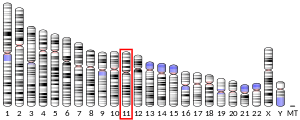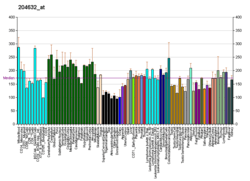RPS6KA4
Ribosomal protein S6 kinase alpha-4 is an enzyme that in humans is encoded by the RPS6KA4 gene.[5][6][7]
Function
This gene encodes a member of the RSK (ribosomal S6 kinase) family of serine/threonine kinases. This kinase contains 2 non-identical kinase catalytic domains and phosphorylates various substrates, including CREB1 and c-Fos. Alternate transcriptional splice variants of this gene have been observed but have not been thoroughly characterized.[7]
Interactions
RPS6KA4 has been shown to interact with MAPK14.[5]
gollark: (Macron does not count as it is:- bad- real, but still bad)
gollark: It's a shame there are NO GOOD PROGRAMMING LANGUAGES whatsoever.
gollark: OH NO. "Kestrel" has undergone semantic satiation.
gollark: Oh, is Kestrel not the .NET Kestrel?
gollark: I don't want to run .NET however?
References
- GRCh38: Ensembl release 89: ENSG00000162302 - Ensembl, May 2017
- GRCm38: Ensembl release 89: ENSMUSG00000024952 - Ensembl, May 2017
- "Human PubMed Reference:". National Center for Biotechnology Information, U.S. National Library of Medicine.
- "Mouse PubMed Reference:". National Center for Biotechnology Information, U.S. National Library of Medicine.
- Pierrat B, Correia JS, Mary JL, Tomas-Zuber M, Lesslauer W (Dec 1998). "RSK-B, a novel ribosomal S6 kinase family member, is a CREB kinase under dominant control of p38alpha mitogen-activated protein kinase (p38alphaMAPK)". J Biol Chem. 273 (45): 29661–29671. doi:10.1074/jbc.273.45.29661. PMID 9792677.
- Deak M, Clifton AD, Lucocq LM, Alessi DR (Sep 1998). "Mitogen- and stress-activated protein kinase-1 (MSK1) is directly activated by MAPK and SAPK2/p38, and may mediate activation of CREB". EMBO J. 17 (15): 4426–4441. doi:10.1093/emboj/17.15.4426. PMC 1170775. PMID 9687510.
- "Entrez Gene: RPS6KA4 ribosomal protein S6 kinase, 90kDa, polypeptide 4".
Further reading
- Xing J, Ginty DD, Greenberg ME (1996). "Coupling of the RAS-MAPK pathway to gene activation by RSK2, a growth factor-regulated CREB kinase". Science. 273 (5277): 959–963. Bibcode:1996Sci...273..959X. doi:10.1126/science.273.5277.959. PMID 8688081.
- Du K, Montminy M (1999). "CREB is a regulatory target for the protein kinase Akt/PKB". J. Biol. Chem. 273 (49): 32377–32379. doi:10.1074/jbc.273.49.32377. PMID 9829964.
- Tomás-Zuber M, Mary JL, Lesslauer W (2000). "Control sites of ribosomal S6 kinase B and persistent activation through tumor necrosis factor". J. Biol. Chem. 275 (31): 23549–23558. doi:10.1074/jbc.M002586200. PMID 10806207.
- Tomás-Zuber M, Mary JL, Lamour F, et al. (2001). "C-terminal elements control location, activation threshold, and p38 docking of ribosomal S6 kinase B (RSKB)". J. Biol. Chem. 276 (8): 5892–5899. doi:10.1074/jbc.M005822200. PMID 11035004.
- Gudi T, Casteel DE, Vinson C, et al. (2001). "NO activation of fos promoter elements requires nuclear translocation of G-kinase I and CREB phosphorylation but is independent of MAP kinase activation". Oncogene. 19 (54): 6324–6333. doi:10.1038/sj.onc.1204007. PMID 11175347.
- Prymakowska-Bosak M, Misteli T, Herrera JE, et al. (2001). "Mitotic phosphorylation prevents the binding of HMGN proteins to chromatin". Mol. Cell. Biol. 21 (15): 5169–5178. doi:10.1128/MCB.21.15.5169-5178.2001. PMC 87241. PMID 11438671.
- Wiggin GR, Soloaga A, Foster JM, et al. (2002). "MSK1 and MSK2 are required for the mitogen- and stress-induced phosphorylation of CREB and ATF1 in fibroblasts". Mol. Cell. Biol. 22 (8): 2871–2881. doi:10.1128/MCB.22.8.2871-2881.2002. PMC 133730. PMID 11909979.
- Soloaga A, Thomson S, Wiggin GR, et al. (2003). "MSK2 and MSK1 mediate the mitogen- and stress-induced phosphorylation of histone H3 and HMG-14". EMBO J. 22 (11): 2788–2797. doi:10.1093/emboj/cdg273. PMC 156769. PMID 12773393.
- Wissing J, Jänsch L, Nimtz M, et al. (2007). "Proteomics analysis of protein kinases by target class-selective prefractionation and tandem mass spectrometry". Mol. Cell. Proteomics. 6 (3): 537–547. doi:10.1074/mcp.T600062-MCP200. PMID 17192257.
- Gesser B, Johansen C, Rasmussen MK, et al. (2007). "Dimethylfumarate specifically inhibits the mitogen and stress-activated kinases 1 and 2 (MSK1/2): possible role for its anti-psoriatic effect". J. Invest. Dermatol. 127 (9): 2129–2137. doi:10.1038/sj.jid.5700859. PMID 17495961.
This article is issued from Wikipedia. The text is licensed under Creative Commons - Attribution - Sharealike. Additional terms may apply for the media files.




